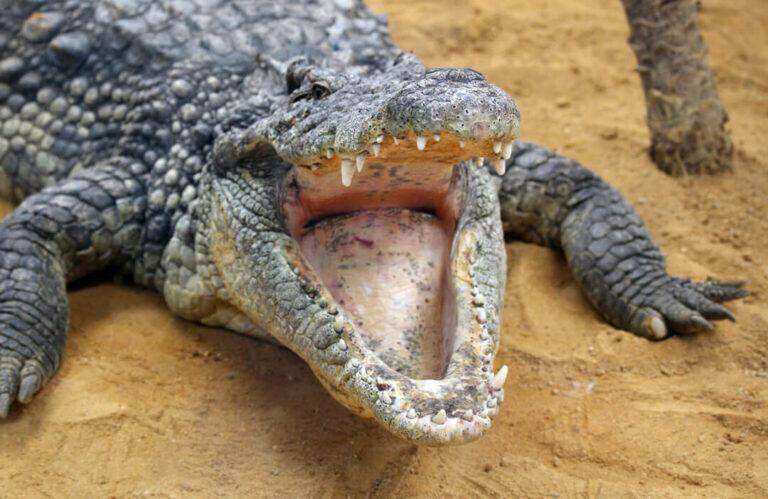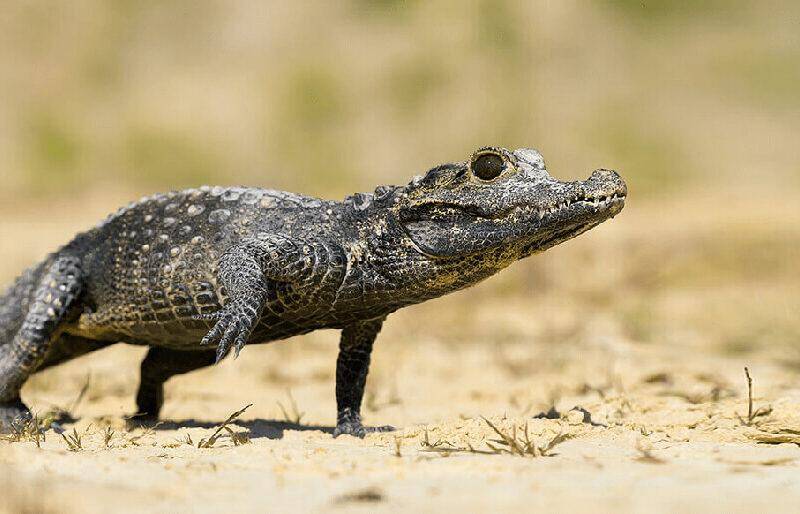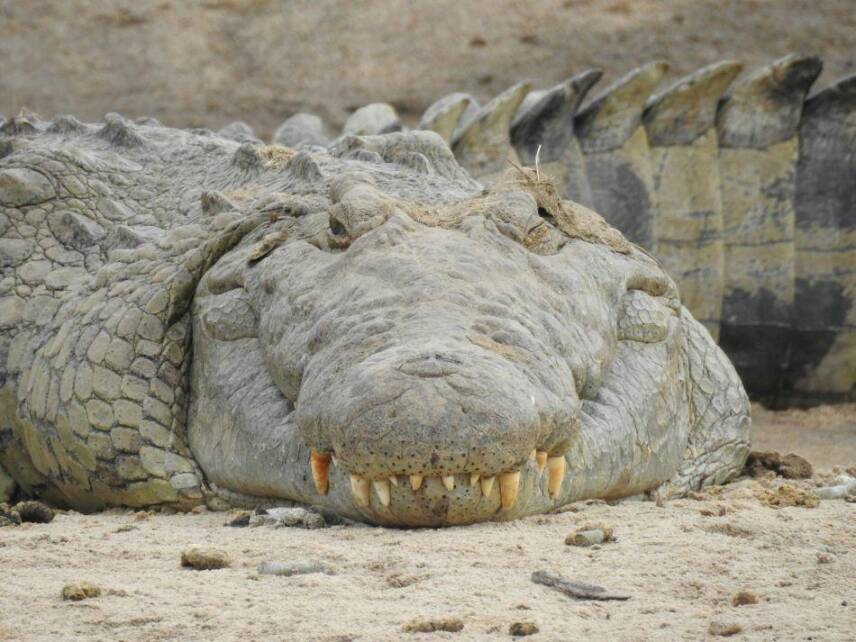Dangerous game hunting in Africa is on the bucket list of many game hunting enthusiasts. Immediately thoughts race to Cape buffalo hunts, perhaps a lion hunting safari, or even elephant hunting in South Africa. But how about considering a different member of Africa’s dangerous 7? It is a target so elusive, cunning, and cold-blooded that it will tear you limb from limb just for the fun of it.
Ladies and gentlemen, welcome to Africa! Let me introduce you to the infamous Nile crocodile.
[DYNAMIC-BLOGTABLEOFCONTENT]
The Nile Crocodile
Even if you don’t like crocodiles or predators in general, a person can grudgingly admit that this apex predator is something to write home about. The Nile crocodile has been around since prehistoric times and has survived and thrived where many others have failed to. Today, this reptile lives in freshwater habitats in 26 African countries and is a force to be reckoned with for all who have the misfortune to encounter it.
In a nutshell, the Nile crocodile is an apex predator and a perfectly designed killing machine. From its row upon row of razor-sharp teeth, and sharp claws to the tip of its large tail, this predator means business. Extremely aggressive, the Nile crocodile will not back down and is a legendary apex predator known for its stealth.
It prefers freshwater habitats, such as rivers, deltas, lakes, and dams, and enjoys a variety of prey, such as fish, zebras, small hippos, antelopes including wildebeest and impala, as well as rodents, and even other small crocodiles. This cold-blooded killer is famous for its powerful bite, as well as its death grip which is almost impossible to free oneself from. This death grip is then turned into its infamous death roll, where the Nile crocodile will hold an animal underwater until it expires. This is a cruel death for any animal to experience.
An adult male Nile crocodile can reach on average 11-16 feet, with a weight of 2,200 pounds. Its large, broad snout holds 64-68 razor-sharp teeth, perfect for ripping and tearing flesh apart. Their scales form almost a body armor that protects them from possible danger.
Crocodile hunting in Africa may see you visit remote areas while testing your hunting abilities, perseverance, and stamina. It will also bring you beautiful views and challenging situations that will see you questioning why you waited so long to book this specific African hunt!
Hunting crocodiles in Africa is one of the scariest, most exciting hunts you will ever experience! The thought of coming face-to-snout with one of the world’s most dangerous predators is enough to shoot that adrenaline through the roof! Crocodile hunting takes time, patience, perseverance, and an experienced hunter who will not stress but calmly listen to their PH and bring home the trophy of a lifetime! Are you that hunter?

Crocodile Species in Africa
While the Nile crocodile is known across Africa and beyond as the perfect killing machine, three other crocodile species call Africa home.
- The West African slender-snouted crocodile (Mecistops cataphractus): This crocodile species is critically endangered and on the verge of disappearing. It is not available as a target on hunting safaris.
- The Dwarf Crocodile (Osteolaemus tetraspis) calls sub-Saharan West Africa and Central Africa home and is seen as a vulnerable species by the IUCN. It is available to hunt in various African countries, but best to check with individual countries’ regulations and requirements.
- The West African Crocodile (Crocodylus suchus): Although smaller than the Nile crocodile, and less aggressive, this predator has also been known to attack and kill humans. It is listed as vulnerable by the IUCN and is an available target on African hunts. It is found in several countries in West and Central Africa.
Crocodiles are hunted for both their skin (hide) and their meat. Their natural habitat is reducing, and they are threatened by the growth of humans and the spread of urbanization, as their prey diminishes and life becomes more difficult to survive.

Where can I hunt Nile Crocodiles in Africa?
Nile crocodiles can be hunted in numerous African destinations, all offering thrilling dangerous game hunting adventures for experienced hunters looking for a new challenging hunting safari experience.
Some popular African hunt destinations to target this prehistoric reptile include:
- South Africa
- Mozambique
- Zimbabwe
- Zambia
- Botswana
- Namibia
- Tanzania
Crocodile hunting in Africa is not for novice hunters nor the faint-hearted; but rather a skilled hunter who is aiming to increase his dangerous game hunting trophies with a challenging and exhilarating hunting experience.
How do I prepare for a Crocodile Hunting Trip in Africa?
Crocodile hunting in Africa is an exciting dangerous game hunting safari that many hunters cannot wait to experience! But it is not as simple as simply choosing a hunt and jetting off into the sunset. Plans need to be made, checked and double-checked to ensure that all rules, regulations, and hunting protocols are adhered to.
Before Booking Your Hunt
- Before booking your African hunt, do your homework in terms of where you would like to hunt, and where the best destinations are for crocodile hunting in Africa.
- Contact us, at Game Hunting Safaris, who can guide you through this process. We have many dangerous game hunting outfitters on our books and can advise you which African hunting adventure would best suit your specific requirements, including timings, hunting method, and even budget.
- A quick thought here: Should the budget allow, consider including a hippo tag as well. Since Nile crocodiles and hippos share the same habitat, it could be a great opportunity to add another one of the Dangerous 7 to your hunting tally!
- Your hunting broker will be able to best match you with professionals in the field, with adequate knowledge and experience in dangerous game hunting safaris.
Preparing For the Hunt Itself
- Once your crocodile hunting adventure is booked, you can start preparing yourself mentally, emotionally, and physically.
- First things first…get your paperwork in order: Update your will. It may sound a bit melodramatic, to say the least, but this is a dangerous game hunting adventure, and anything can happen, whether we like to consider this or not.
- Start walking and upping your fitness levels – stalking crocodiles may sound uneventful or even not very taxing, but don’t be fooled. A Nile crocodile can reach a speed of 12 miles per hour on land, not bad for a reptile that spends most of its time in the water! The average running speed of humans is around 6 miles per hour, with top speeds being about 28…do you now see why you might need to up that training a bit?
- Learn some background information about the destination to where you are traveling, such as expected weather conditions, topography, and even local culture.
- Learn the anatomy of the crocodile, this will stand you in good stead during the hunting safari.
- Do some research on shot placement when crocodile hunting. Due to a crocodile’s thick, armor-like scales, shot placement options are fewer than with other hunting targets.
- Participate in some hunts and enjoy target practice as you prepare for the hunting adventure of a lifetime!
What should I pack for a Crocodile Hunting Safari?
While there is every chance that your laundry will be done daily while in camp, I would suggest packing clothes that are quick-drying, lightweight, and moisture-absorbent.
- Include both long and short-sleeved shirt options as long sleeves will protect you from rough vegetation, such as thorns, as well as critters like mosquitos.
- Shorts or long pants for the hunt.
- 2 x pairs of waterproof boots that are well worn. Blisters are the last thing you need to spoil your African hunt!
- Socks – many pairs, as foot odor is known to attract critters
- Hat (with neck cover)
- Warm jacket and beanie (even in the summer months, it can get cold when you are out early in the mornings or late in the evenings)
- Casual outfit(s) to wear in camp or traveling to and from the crocodile hunt
- Underwear and toiletry items
- Medications
- Chronic medications
- A general, broad-spectrum antibiotic, in case you become ill
- Anti-nausea as well as anti-diarrhea medication
- Eye drops
- Pain tablets
- General supply of band-aids, antiseptic cream
- Sunblock
- Mosquito repellent
- Your rifle, along with the allowable ammo, if you are taking your own rifle
- Binoculars
- Sunglasses
- Contact lenses and solution
- If you wear glasses, don’t forget to pack a spare pair.
Remember too, to make copies of all important documents, keeping one set at home with a trusted friend and the other with you.
FAQs when Crocodile Hunting in Africa
Where are the best destinations to hunt the Nile crocodile?
While the Nile crocodile is found across the African continent, three destinations stand out head and shoulders above the rest, namely Mozambique, Zambia, and Zimbabwe.
Mozambique’s renowned Lake Cahora Bassa is famous for its monster Nile crocodile trophies while Lake Kariba in both Zambia and Zimbabwe produces exceptional Nile crocodile game hunting trophies.
Are Nile crocodiles dangerous to hunt?
The Nile crocodile is a member of the Dangerous 7, meaning that they are one of the seven most dangerous African animals to hunt. The crocodile, as well as the other members of the Dangerous 7, including the lion, leopard, hippo, Cape buffalo, rhino, and elephant, are unique in the challenges that they offer the hunters targeting them. The one thing, however, that they do have in common, is their willingness to take out anyone or anything that is considered a threat. They are considered extremely dangerous to hunt.
Is the Nile crocodile aggressive?
Yes, these cold-blooded reptiles are very aggressive, opportunistic apex predators that will attack anything and anyone that crosses their path.
What is the best shot placement when crocodile hunting?
When it comes to shot placement on this dangerous game adversary, ensure that you are 100% sure of your shot, or wait for another opportunity. Learn more about shot placement on this apex reptile predator.
What type of rifle should I use for crocodile hunting in Africa?
A high-powered, accurate rifle is highly recommended when hunting crocodiles in Africa. Shots will be at the brain, through a thick skull, or the vertebrae. A 7mm. 300-win mag or .375 are good options, especially when targeting larger crocodiles during your Africa hunt.
Can you eat Crocodile Meat?
Crocodile meat is seen as a delicacy by many, and I consumed it many years ago in a restaurant in South Africa, but I must admit that I would not eat it again after hearing another hunter’s viewpoint on the subject.
A successful dangerous game hunter with a recent crocodile hunt under his belt, this hunter pointed out that these crocodiles are, in fact, maneaters with more than 500 human deaths per annum as a result of Nile crocodile attacks. Knowing these facts, he has chosen not to consume any crocodile meat during his hunting safaris, for rather obvious reasons. And I must say, l think I will follow his example!
Can I use my bow for my Nile crocodile African hunt?
Yes, bow hunting of crocodiles is legal in some African countries, including South Africa, Botswana, and Zimbabwe. Mozambique, Namibia, Tanzania, and Zambia do not allow bow hunting of crocodiles or other dangerous game.
Should you be interested in dangerous game hunting using a bow, confirm timeously with your African outfitter, as it is usually quite an involved process with many forms, rules, and regulations to follow.
Crocodile Hunting in Africa: The Perfect Dangerous Game Hunting Package
The Nile crocodile remains the perfect dangerous game hunting trophy for any hunter. The crocodile’s strong jaws, powerful bodies, impressive speed both on land and in the water, and agility, together with their unparalleled stealth, have them rated as one of the world’s best apex predators in their habitat. If you are considering a dangerous game hunting safari with a difference, then crocodile hunting in Africa is for you!
If you enjoyed these crocodile tips, read about one man’s experience of crocodile hunting in Mozambique, and see what makes this apex predator such an adrenaline-filled hunting adversary.
Author: B. Hershensohnn
